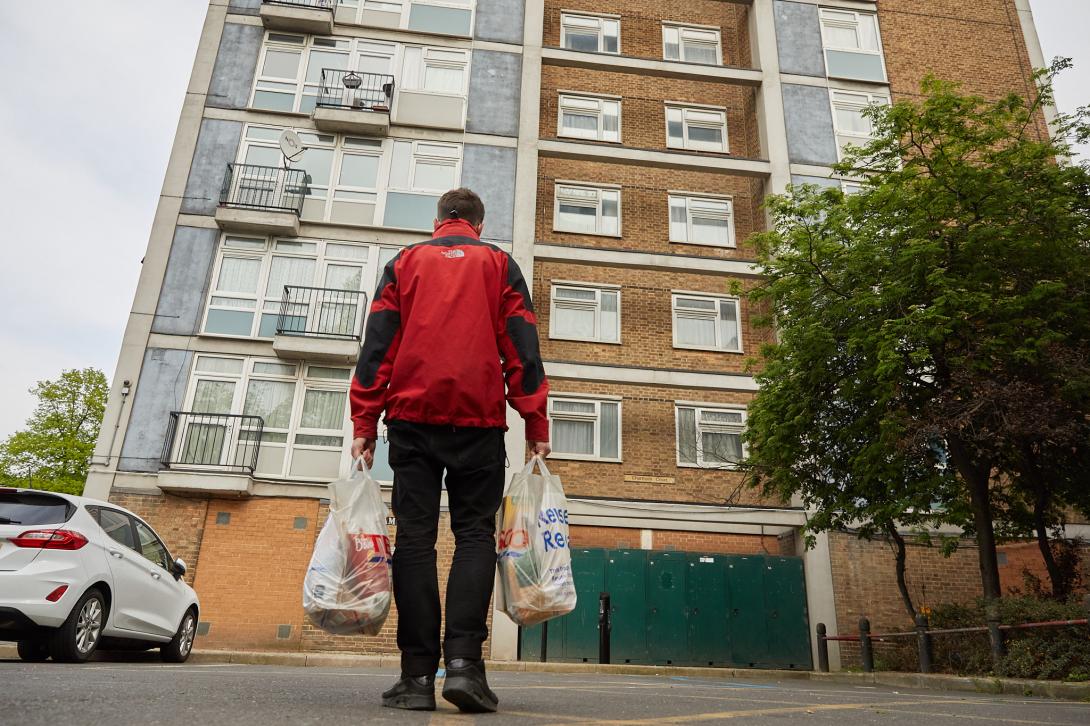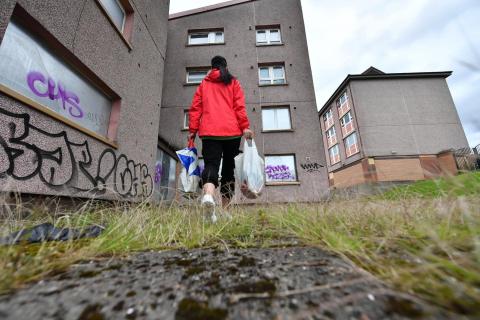23 May 2022
Breadline Voices: 'No one wants potatoes because they can’t afford to turn on the gas'

By Damien Conrad, The Felix Project
Damien Conrad manages food partnerships for The Felix Project charity – the biggest surplus food distributor in London. He describes the daily challenges of delivering food aid as the capital’s food insecurity problem becomes ever-more entrenched.
I’ve worked at The Felix Project for four years; I spent three years at our depot, and now my role is to partner with frontline organisations that need surplus food deliveries from us, making sure we understand their needs. We link to borough councils and food partnerships to share best practice and make sure people are working with referral mechanisms so they are moving to a more dignified way to thrive rather than just survive. We also have a school programme, delivering to 150 schools and adding an educational offer on food waste too.
We deliver to 1,000 organisations already across the capital but every day the phone is ringing off the hook from frontline originations needing more food. We’ve gone from two food distribution depots two years ago to four depots; we have become part of the FareShare network making us the frontline food delivery service in London. FareShare makes sure we get 20% of the food that is available nationwide which illustrates the high food poverty level in London.
We are not just seeing increased need in the capital; where there is a need, it’s getting more entrenched, more profound. There are larger numbers of people relying on frontline organisations – often meaning there are queues around the block. For example, the Harrow Hub in Northwest London is feeding 1,700 families every Saturday – the queue is a mile down the road. People will often turn up at a food bank at eight in the morning despite the fact they know it will open in the afternoon. You often hear people asking; ‘how can you guarantee people need the food?’ No one queues all day if they don’t really need to.
Because we are a surplus food organisation, we often have seasonal stock – right now, we are coming to the end of the root vegetable season. Because long-life food is not deemed surplus, we don’t get a lot of pasta or rice. Unlike potatoes, which we get lots of but which take much longer to cook. The community organisations we are supplying are telling us that no one wants potatoes because they can’t afford to turn on the gas to cook them.
Working with the borough councils, we are trying to promote more food coops and community supermarkets, pantries and cash-first so we give people the ability and means to access the benefits they deserve and are entitled to. At food pantries, people go in and have choice, which is more dignified. But where there is a traditional food bank and queues, more and more so, it’s becoming disorderly, with increasing occurrences of food arriving, and members of the public diving in and grabbing it. The community organisations are trying to recruit more volunteers to deal with this. I recently drove down to Tower Hamlet’s borough Hub – where they are doing an amazing job distributing 40 tonnes of food a week. However, food is being bought to add to Felix Project surpluses but the funding available for food purchase is reducing, with an inevitable impact on residents.
We are delivering to everyone from, homeless hostels, to refugees to people with No Recourse to Public Funds, but we are especially seeing more families slipping through the net. The reason we built our new depot in Poplar was because Tower Hamlets has the greatest level of poverty of London boroughs – we are talking about more than 50% of children on Free School Meals. But when you look at the criteria of Free School Meals, there are a lot more in poverty who don’t necessarily qualify.
When term time finishes, we divert all the food that was going to schools to holiday programmes. Pre-Marcus Rashford, we were struggling to find holiday schemes – you were mostly reliant on the altruism of people on the frontline. Now it is better – but when you look at the number of children on Free School Meals in a borough and compare it to the number of children being fed by the Government’s Holiday Activities and Food schemes, there is a big gap.
In terms of our ability to meet the city’s needs – The Felix Project has finite resources. The food system in the UK is badly broken; whilst there is a lot of surplus food available and the millions of kilos that we do distribute broadly mirrors the NHS Eatwell guide, we can’t ever hope to be a panacea for 2.5 million Londoners going hungry.
This is part of Breadline Voices, a series from The Food Foundation highlighting the realities faced by millions of families plunged into food and fuel poverty as food prices reach a 40-year high.

Want to help? Please support our #FeedtheFuture campaign
Are you an MP? Click here for our latest briefing
Are you a food business? Click here for our latest report
Are you a journalist? Click here for our latest work



